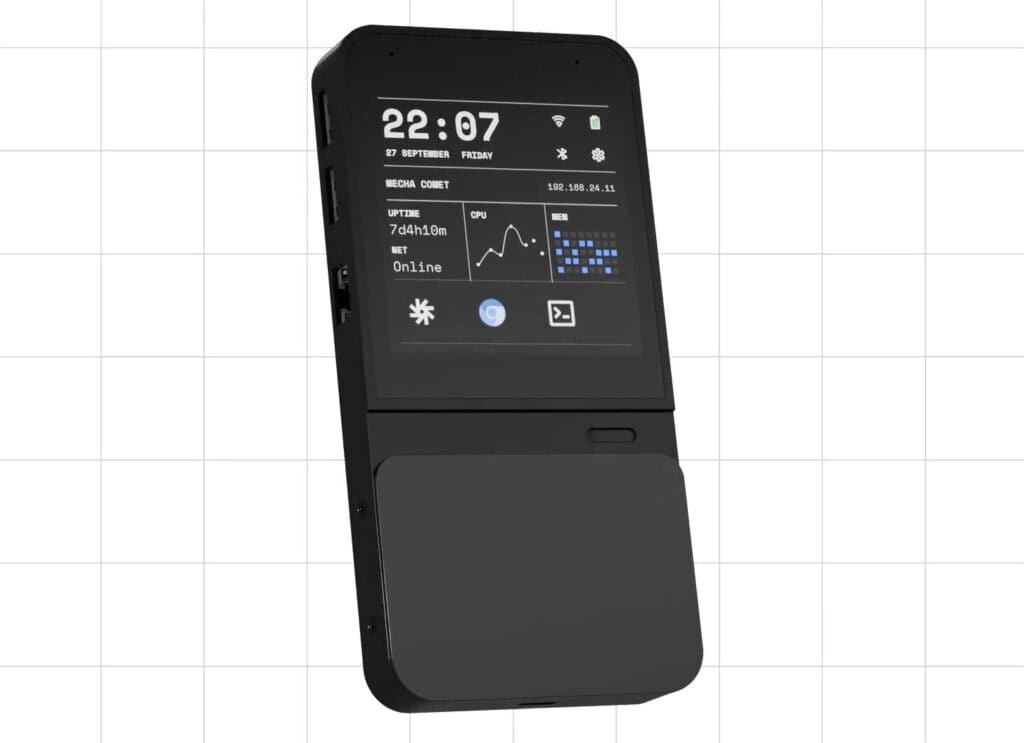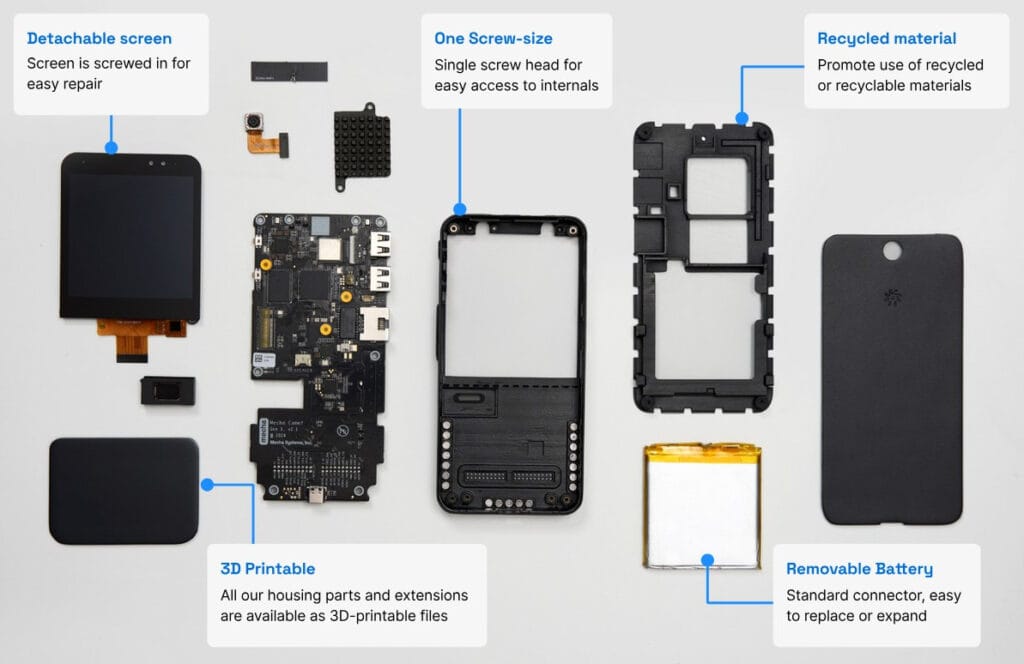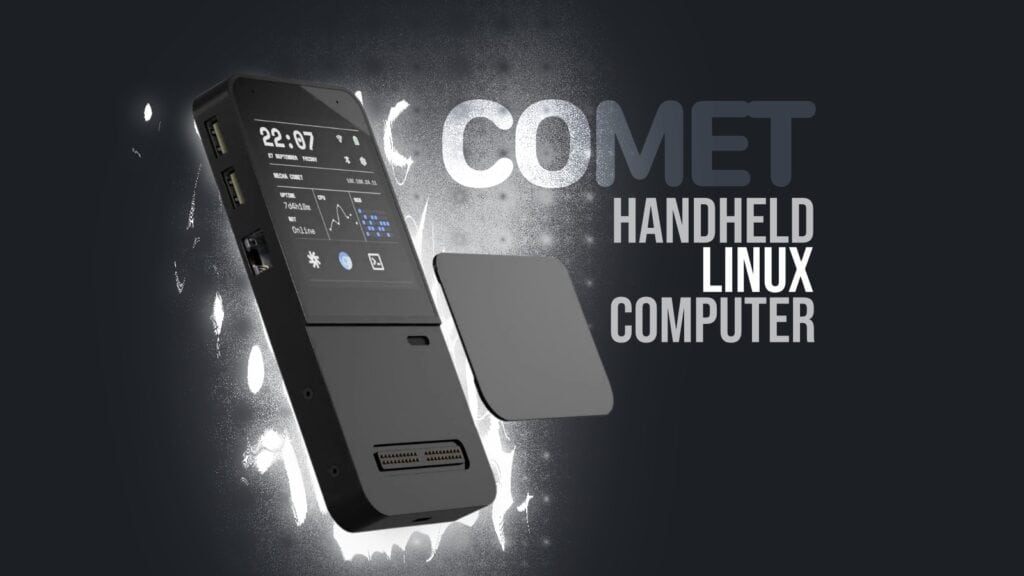If you are an open-source enthusiast looking for a portable computing device that offers true versatility, then you will likely be thrilled by what Mecha has in store. The company recently unveiled the Comet, an innovative handheld Linux computer designed to adapt to almost any situation.
Powered by the Debian-based custom Mechanix OS, the Comet promises a remarkable degree of extensibility in both hardware and software—so it is not just another device that you purchase once and never update.
Instead, the Comet is built with expansion in mind, allowing you to pick from standard “snap-in” extensions (such as a keyboard or gamepad) or even create your own modules for more specialized tasks.
One of the most exciting aspects of the Comet is the variety of extensions it supports right out of the box. For instance, if you are an avid gamer, you can attach the Gamepad extension, which has soft-press buttons and plug-n-play compatibility.
Meanwhile, if you prefer a more traditional text input, you can snap on the Keyboard extension featuring tactile ABS keys. In both cases, you simply “snap in, snap out,” and move on with your day—no fuss, no muss.

For hardware tinkerers, the GPIO extension unlocks the Comet’s 40 IO pins, enabling a serial console over USB-C. This versatility means you can hook it up to nearly any sensor or device that suits your fancy.
Moreover, because the team at Mecha wants to foster an open-source community, they have provided design files and documentation so users can build entirely new extensions from scratch. In other words, if you dream it, you can probably build it—with a little help from your friends.
Because the Comet runs a full-fledged Linux operating system, the project possibilities seem endless. For example, those craving a DIY communications challenge could transform their Comet into a Linux Phone by attaching an LTE modem.
Aspiring aviators might design a Drone Launch & Remote system, complete with a handy launchpad and remote-control capabilities. Not content with mere aerial pursuits? Well, how about taking it to space? Mecha proudly boasts that you can send the Comet into orbit as part of a Nano Satellite project for educational or experimental purposes.
But wait, there’s more! You can attach a CAN or OBD port for a “Car Whisperer” setup, letting you interface directly with your vehicle. Alternatively, you could build a next-level AI Assistant that prioritizes your privacy and runs entirely on the Comet. Feeling extra adventurous?
Try building a Tricoder for your cosmic explorations—yes, Star Trek fans, you read that right. The Comet’s robust hardware even makes it feasible to create software-defined radio projects or pen-testing tools for advanced users, all in a compact, user-friendly device.
Under the hood, Comet runs on a 1.8 GHz Quad-core ARM Cortex-A53 (64-bit) processor, supported by 4GB of LPDDR4 RAM and 32GB of eMMC flash storage. Needless to say, the device runs entirely on open-source software.

Thanks to Mechanix OS—a Debian-based distro that taps into over 60,000 packages—you will have no shortage of software options.
Plus, Mecha has developed a custom UI framework in Rust, optimized for GPU rendering on Wayland, making the interface smooth and modern. Additional specifications include:
- 3.4″ IPS LED display with capacitive touch
- 2.4 GHz/5.0 GHz 802.11ac Wi-Fi and Bluetooth 5.0
- 5 MP camera (complete with auto-focus)
- 3000 mAh battery with USB Type-C charging
- M.2 slot (PCIe 2.0, 1x lane)
- Gigabit Ethernet and 2x USB 2.0 ports
- Built-in sensors like a gyroscope and RTC
Now for the best part: the Comet will soon be live on Kickstarter (where the project has already accumulated over 5K followers) at a tempting price of $159, with a launch in early Q1 2025. If you want to secure a super early-bird offer, you can join the waitlist via Mecha’s pre-launch page.
See the project’s website for more information on the new Linux handheld device.
Image credits: Mecha

All this is fine, except…forget all the hype. Hype is good; hype is necessary; hype is needed in a case such as this. BUT (and this is a very big "BUT": I can't find any VERY BASIC information, anywhere, like detailed information on the MechanixOS operating system.Uhhh…forget the "…detailed…" part: I can't find ANY information, at all, on MechanixOS.If Mecha wants to rope in the people who will help to seriously ensure this device's adoption, much more detail, along with the really-well-done PR material (very good job on that, Mecha) is needed.
I would see fit to have a built in (e)SIM. Is this in future plans?
arm crap